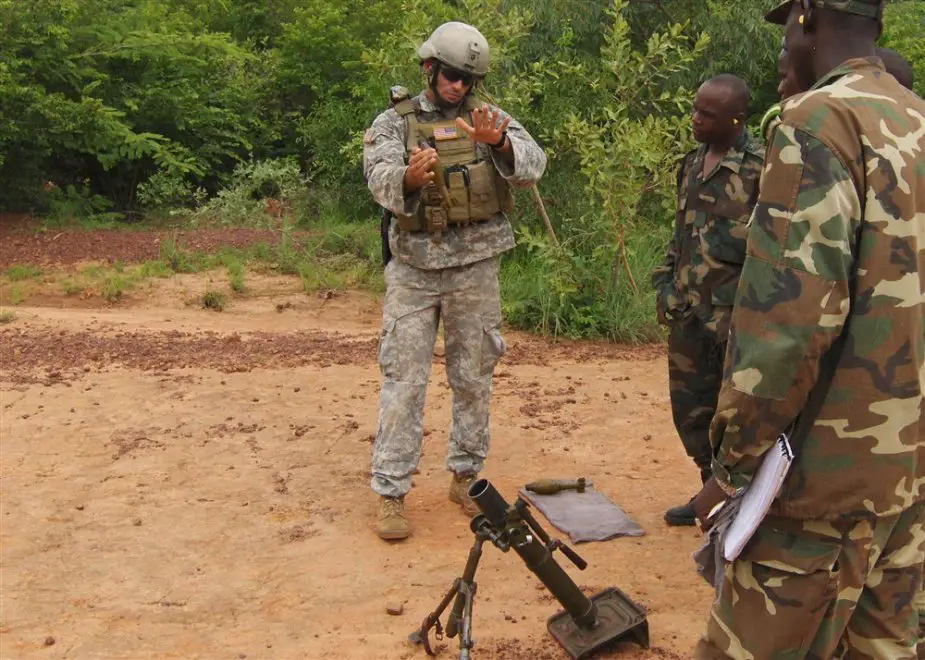Breaking news
Less US commando and special force missions in Africa.
In the wake of various defense spending decisions, the Pentagon has reviewed the relevance and affordability of special force operations and adviser missions in Africa. Sharp cut ahead!

Bamako, Mali. A French-speaking U.S. Special Forces NCO with Special Operations Command Africa explains mortar aiming techniques to members of a Malian counter-terrorism unit during a military training engagement recently conducted near Bamako. U.S. Special Forces teams provide capacity development training and advisement during more than 30 pre-scheduled military training engagements conducted annually in the Trans-Saharan region under the auspices of the Trans-Saharan Counter Terrorism Partnership (TSCTP), a U.S. State Department initiated and led program designed to enhance security and stability in the region. Department of Defense TSCTP activities in the region are planned, coordinated and conducted as part of Operation Enduring Freedom (Trans-Sahara) and are managed by SOCAFRICA's Joint Special Operations Task Force-Trans Sahara. (Photo: JSOTF-TS Public Affairs)
Weeks ago, U.S. Defense Secretary James Mattis ordered an assessment of special operations units. A new balance must be established between, on one side, the external operations and, on the other side, the will to combat rising threats from Russia and China. Currently, more than 7,300 Special Operations troops are working around the world, many of them conducting shadow wars against terrorists in Yemen, Libya, Somalia and other hot spots. The Special Operations Command in Tampa, Florida, has assumed important new missions in recent years, as well, like taking the lead on combating weapons of mass destruction.
As reported in the Strait Times (Singapore), Pentagon officials said Mattis and General Joseph F. Dunford Jr., the chairman of the Joint Chiefs of Staff, are worried that the commandos are spread too thin. The two leaders have ordered the military's Special Operations and Africa commands to present a range of options by mid-June to balance rising security challenges – which include North Korea and Iran – with vital counterterrorism operations.
A Pentagon investigation last month into the deadly attack in Niger exposed a risk-taking culture among commandos. That accelerated Mattis' decision to abandon some counterterrorism missions in Africa to focus on global powers, according to two Defense Department officials who spoke on the condition of anonymity. "We need to do CT more efficiently and effectively," said Stephen Tankel, a former senior Pentagon adviser.
The transition to focus on Russia and China was outlined in the Trump administration's national defense strategy released in January. Even before Mattis' directive, the Special Operations Command had started relying on conventional troops to help handle some of the missions it had accumulated since the September 11 attacks. In places where Special Operations troops are frequently in combat, such as Afghanistan and Syria, regular soldiers and Marines are sometimes attached to commando units as additional security or firepower in what is known as the "uplift" program.
At the same time, in a nod to the increasing concern about the Russian military, more Special Operations teams have been sent to the Baltic countries - Estonia, Latvia and Lithuania - and Eastern Europe to help local commando forces identify and confront possible threats from Moscow. Some of the reassigned troops from Africa missions could be put on potential missions against Russia or China. Or, officials said, they could rotate into deployments to ease the strain on US commandos who have repeatedly been sent abroad.
US commandos in Africa are now sent only on missions with local forces that are determined to have significant strategic effect, like building a new base or clearing extremists from a large area. Armed drones or other protective aircraft must accompany such missions. If those conditions are not met, US troops will work from fortified command centers to advise African forces on intelligence, logistics, artillery and other aspects of big operations that are important - but not as prominent as front-line combat against a range of groups aligned with al-Qaeda or the Islamic State in Iraq and Syria.


























